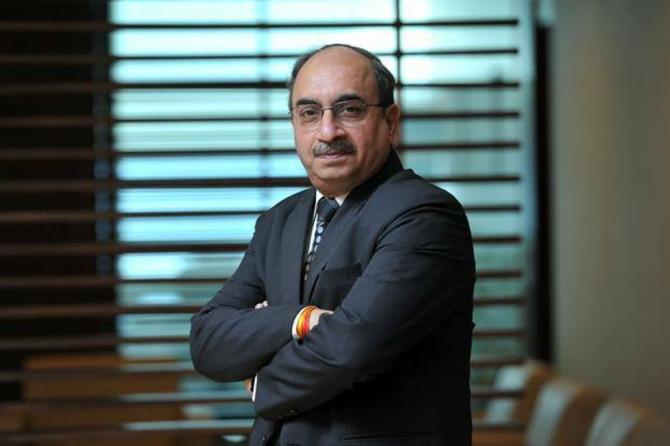Dinesh Kumar Khara is someone who cares for others's ideas and suggestions.
If he takes the people along with him (which he always does); cares for the customers (80 per cent of SBI's new customers are in the 20-40 age group); and doesn't take his eyes off technology, his job is done, says Tamal Bandyopadhyay.

Rajnish Kumar moved into the corner room at India's largest lender on October 7, 2017 with a broom. In the next three quarters, the State Bank of India announced losses in a row, some Rs 15,010 crore (Rs 150.10 billion) -- unprecedented in its 215-year history.
In his 40-year career, Kumar missed a promotion only once, but that didn't come in the way of getting the top job. One quality that distinguished Kumar from many of his peers is his no-frills approach to banking. He didn't show off as a great visionary, but knew how to clean up the bad-loan mess and move ahead with new initiatives.
When Kumar took over, SBI's deposit portfolio was Rs 26.23 trillion (it had a big jump in March 2017, following the merger of associate banks and Bharatiya Mahila Bank with it). By June 2020 (the quarter for which the latest data is available), it has risen to Rs 34.19 trillion. The credit portfolio, during this period, has risen from Rs 18.92 trillion to Rs 23.86 trillion.
The low-cost current and savings accounts, or CASA, as a percentage of deposits has remained around 45 per cent in the past three years but the net interest margin, or the difference between its cost of funds and the interest earned on deployments of funds, has risen from 2.43 per cent to 3.24 per cent. The savings bank deposit rate at SBI is now lower than most banks.
Its gross non-performing assets (NPAs) were Rs 1.86 trillion in September 2017. The pile had risen to Rs 2.23 trillion in March 2018, but since then the graph has been moving southwards.
In June 2020, it dropped to Rs 1.3 trillion. In percentage term, the gross NPAs had risen from 9.83 per cent in September 2017 to 10.91 per cent in March 2018 before dropping to 5.44 per cent in June 2020.
Similarly, after setting aside money, the net NPAs, in absolute term, which were Rs 97,896 crore (Rs 978.96 billion) in September 2017, rose to Rs 1.11 trillion in March 2018 before dropping to Rs 42,703 crore (Rs 427.3 billion) in June 2020.
In percentage term, the net NPAs were 5.43 per cent in September 2017; in June, they dropped to 1.86 per cent after rising to 5.73 per cent in March 2018.
Finally, the provision coverage ratio (including the written-off accounts), which was 65.1 per cent in September 2017, has progressively risen to 86.32 per cent in June 2020.
Kumar fought hard to clean the balance sheet by recognising bad loans and recovering them, aggressively chasing the defaulters within and outside the ambit of insolvency law. He has changed the bank's credit appraisal process and repositioned its corporate accounts group from being the centre for giving credit to large corporations to the best-rated ones.
Around 42 per cent of SBI's loan book consists of corporate loans and 58 per cent retail loans.
Kumar also made the elephant dance by going for large-scale end-to-end digitalisation -- branded YONO. The idea is to turn SBI from a life cycle bank to a lifestyle bank, which goes beyond meeting the credit needs of its customers.
Just seven out of every 100 banking transactions at SBI now happen at branches. After acquiring 2.8 crore YONO customers in India, the bank is planning its launch overseas.
The rapid digitalisation has brought down its cost to income ratio by 10 percentage points in the past three years, from 57 per cent to 47 per cent.
Finally, Kumar has been instrumental in rescuing Yes Bank Ltd, in a non-disruptive way and on his terms. SBI is set to make money from its investment in the large private banks that had been through hell.
What's the task ahead for his successor Dinesh Kumar Khara?
One out of every three Indian banks with the SBI. Managing it is no easy job, but Khara is no outsider; he can hit the ground running from day one. A Delhi School of Economics alumnus, Khara has a finger in every pie of the bank's business by being part of the board as a managing director for the past four years.
He has experience across most verticals of banking -- retail, small and medium enterprises and corporate credit, deposit mobilisation, international banking operations and branch banking. Khara has been managing the overseas subsidiaries and was instrumental in acquiring a bank in Indonesia.
He has overseen the merger of the associate banks with SBI, sold part of its stake in UTI Mutual Fund to T Rowe Price, and moved the bank's own mutual fund business from the sixth to the top position, in terms of assets under management. He is quiet, introspective and someone who cares for others's ideas and suggestions.
If he takes the people along with him (which he always does); cares for the customers (80 per cent of SBI's new customers are in the 20-40 age group); and doesn't take his eyes off technology, his job is done.
But that's keeping the bank where Kumar has placed it.
To take it to the next level, the SBI needs to be transformed into a marketplace, meeting all financial needs of its corporate clients in the entire value chain.
Another priority could be financing agriculture in a meaningful way. The bank has already created a vertical for this.
By embracing digitalisation in a big way, Kumar has created the ground. Khara can sow the seeds and reap the benefits by improving the efficiency of the delivery channels. This can be done by re-orienting a large part of the bank's over two lakh employees into a sales force.
Smart use of data and analytics can bring down the cost to income ratio -- the key to a bank's profitability.
Of course, the immediate challenge for Kumar's successor is preservation of the quality of loans being affected by the Covid pandemic and restructured, but that's a challenge for the entire industry, not SBI alone.
With Khara taking over the mantle, the SBI is in safe hands. In the recent past, eight of his colleagues have left to head other banks.
Insiders should thank the Banks Boards Bureau for not setting its eye on Khara for another bank.
Tamal Bandyopadhyay, a consulting editor with Business Standard, is an author and senior adviser to Jana Small Finance Bank Ltd.












 © 2025
© 2025